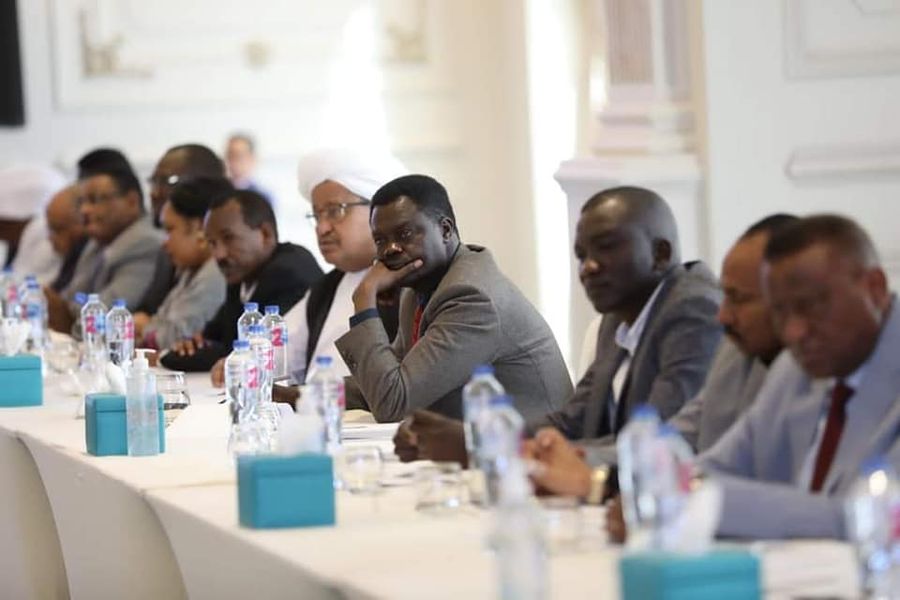Mix of optimism and doubt as Egypt-brokered Sudan conference concludes

Delegates at the inter-Sudanese dialogue in Cairo (Social media handout)
CAIRO / KHARTOUM / NYALA –
The inter-Sudanese dialogue in Cairo concluded their conference on Tuesday, after agreeing to a full civilian government, as well as proposing a cabinet made up of non-partisan technocrats aligned with the revolution.
In a press statement issued on Tuesday by the conference participants, they renewed their adherence to the 2020 Constitutional Document, and proposed some contemporaneous amendments “in line with the current process”.
Alongside these decisions outlining the next steps for Sudan, the *85 participants in the Egypt-brokered conference also affirmed their commitment to implementing the Juba Peace Agreement (JPA), adding that they would address “the situation in eastern Sudan with an acceptable negotiating platform that involves relevant stakeholders”.
At the conclusion of the six-day Cairo dialogue conference initiated by the Egyptian government, the participants signed the Political Accordance Document, which is to be the governing document for the upcoming transitional period.
According to the final press statement, the Sudanese representatives agreed to form the National Forces Coordination “as an umbrella for all participants to carry out the task of communicating with all parties supporting the democratic transition”.
El Amin Daoud, a leading member of the Forces for Freedom and Change-Democratic Bloc (FFC-DB) alliance, told Radio Dabanga that the participants in the workshop agreed on mechanisms for selecting members of the executive and sovereignty councils.
The workshop called on the junta forces to distance themselves from all political and societal forces and not to interfere in political affairs.
The participants called for holding those responsible for crimes in Darfur, Blue Nile and South Kordofan “politically and legally accountable in accordance with the prevailing laws, and through traditional justice and transitional justice”, but did not refer to the extradition of wanted persons to the International Criminal Court (ICC) in The Hague.
The conference called on “all forces supporting democratic transition to meet and discuss the national issues in order to reach a consensus”.
Doubts in Darfur
Lawyer Adam Sharif criticised the text on justice for the victims of the civil wars in Darfur, Blue Nile and South Kordofan. He told Radio Dabanga that “violations of private and public rights cannot be pardoned by prevailing laws when these crimes include crimes against humanity and genocide”. He further stressed the necessity of handing over the wanted persons to the ICC.
Yagoub Furi, head of the Darfur Displaced and Refugee Camps Coordination, commented by saying that the amnesty mentioned by the participants of the Cairo Conference can only come after justice.
Furi stated that “any talk about amnesty is an attempt to release Al Bashir and his cronies”, adding that “amnesty is a special right for the families of the victims.”
The recent conference on the Juba Peace Agreement (JPA) in Khartoum, organised by the AU-IGAD-UNITAMS Trilateral Mechanism, witnessed the absence of prominent displaced community leaders, due to them not being invited.
Furi criticised “the disregard of the Darfur displaced” by the organisers of the Cairo dialogue, stating that “we have nothing to do with the outputs of the Cairo conference, as they do not concern the victims and the displaced”.
He called for the formation of “a real civilian government in order to implement transitional justice issues”.
Saleh Eisa, head of the Darfur Displaced and Refugee Camps Administration, also played down the importance of the conference, stating that “the displaced adhere to justice and the extradition of wanted persons to the ICC and other criminal courts before talking about reconciliation and amnesty”.
*The 85 participants in the conference belong to three political blocks that represent 35 political parties and groups, and rebel movements: the FFC-DB alliance, founded in November last year by a number of rebel signatories to the JPA, and includes the mainstream Democratic Unionist Party and the Beja Nazirs Council wing chaired by Sayed Tirik, in addition to the National Movement Forces headed by El Tijani Sisi, and the Living Revolutionary Forces Alliance, chaired by Ahmed El Baroon.











 and then
and then